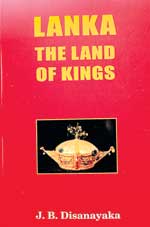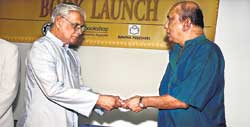
Kala KornerBy Dee CeeAll about royalty in Sri Lanka Tea or a book! Of course, the two are poles apart. This was the dilemma that ambassador-designate to Thailand and Cambodia, Emeritus Professor J.B. Disanayaka (who has authored a record 133 books in the past four decades) faced when he was told at a Foreign Ministry briefing that it is customary to exchange gifts when an ambassador presents credentials to the Head of State. He thought about it and decided to write a book. He chose royalty in Sri Lanka as the topic. After all he was going to meet the royalty in Thailand where the king is celebrating his 80th year. Such a book can also be a tribute to a great civilization that lasted over 3000 years from Ravana to Sri Vikrama Raja Sinha.
"I was told my task would be to project the good image of Sri Lanka. At the moment Sri Lanka's image is not that positive. In fact there are two phases to our image - pride and prejudice. The pride comes from our cricketers - a wonderful set of players we have brought fame to our country. Prejudice comes from our relations with the LTTE. Newspapers across the world flash news items about the LTTE all the time," JB explained at the launch of his latest book 'Lanka the Land of Kings' at the BMICH recently. The time factor was the problem. Yet he took up the challenge. It took him only one and a half months to write it and print it. "I read the Dipavamsa, the Mahavamsa, the Culavamsa, the Rajavaliya and the 'Vamsakathas' - Bodhivamsa & Dhatuvamsa - and contemporary historical works. I had my material and set about the task." In 'Lanka Land of the Kings', JB has presented Sri Lanka's royalty not as a historical chronology but in a more interesting manner. He discusses numerous aspects of kingship providing the reader with a new insight to how the royalty ruled the country. In fact, the book is a 'two in one' edition. One is 'About Kings' where JB discusses their ideals, their possessions, their ceremonies, their councils, their patronage to religion and so on. In the other, he picks 35 of the most outstanding kings and queens and relates how they served the people. "My humble tribute to these architects of our island civilization," he says. A worthy gift “A worthy gift to royalty" is how eminent historian Dr. Lorna Devaraja described the book at the launch. She reminded us that there was a special significance in that the book is to be gifted to the only Theravada Buddhist king in the world and the longest reigning one at that - he has ruled for 60 years.
Referring to the impact of the close ties Sri Lanka and Thailand have maintained over several centuries, she recollected how when she was working in Thailand sometime back, women in the fish market would salute her 'Namo Tassa Bhangawato' no sooner they got to know she was from Sri Lanka. Such was the knowledge of the average Thai person about Sri Lanka. That was because of the long history of the relationship. Touching on the contents of the book, she complimented JB for picking up interesting aspects of royalty in Sri Lanka. She wondered whether there were other countries where kings wrote books on medicine as King Buddhadasa did in writing 'Sarartha Sangrahaya' and Bhesajja Manjusa' or where kings were learned poets and scholars or who were surgeons and physicians in their own right. Sri Lankan kings were statesmen and diplomats. Devanampiyatissa was one such king who built up a strong relationship with King Asoka using such ties to great advantage. In later times, King Rajasinghe II was one who faced foreign invaders with great skill and far sighted vision. She described the relationship between Thailand and Sri Lanka dating back to the 14th or the 15th century but it was in the 18th century that more was heard about the activities between the two countries, she said. A long name Discussing the evolution of the cultural and political aspects of kingship in Sri Lanka, Tissa Abeysekera paid tribute to the effort of Rajapakse Rajakaruna Mahawasala Dukganna Disanayaka Mudiyanselage Jayatilaka Banda Disanayaka ('a double barrelled name' as Tissa put it). The names indicate several qualities - being loyal to the king, beloved of the king and suffering for the king. Chief guest Sam Wijesinha lauded JB's effort at writing 133 books during a distinguished academic career spanning nearly four decades. "A remarkable feat" is how he described the effort. In his inimitable style, he revealed how at least three Kandyan chieftains who signed the Kandyan Convention in 1815 were illiterate as could be judged by their signatures which were neither Telugu nor Sinhala but a combination of a few letters they had picked up. Stating that Ehelepola had signed in Tamil, he opined that the Kandyan court adopted a language of the kings who were Nayakkars though they became Buddhists - more for convenience. People lived in harmony in the Kandyan kingdom and he quoted an instance when as a Crown Counsel way back in 1950, when he asked for the name of a sarong clad headman in court, he said he was Ratnayaka Mudiyanselage Ibrahim Lebbe. The Kariapper family from Batticaloa had produced generation after generation of physicians for the Kandyan king. He pointed out that though Sri Vickrama Raja Sinha was considered a cruel king, there was another aspect to his personality. He was a popular king. The poor people could appeal to him against any injustice. He then traced the harmonious relationship that was built over the years since the days the Arab traders arrived here. Referring to the tactics of the British he related how when Sri Vikrama Raja Sinha moved to Hanguranketa, the British entertained the chieftains with wine flowing and bought them over resulting in their betraying the king. |
|| Front
Page | News | Editorial | Columns | Sports | Plus | Financial
Times | International | Mirror | TV
Times | Funday
Times || |
| |
Reproduction of articles permitted when used without any alterations to contents and the source. |
© Copyright
2007 Wijeya
Newspapers Ltd.Colombo. Sri Lanka. All Rights Reserved. |

